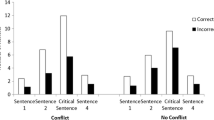Abstract
A student may hold inconsistent beliefs, buthas a tendency to avoid those inconsistencies that have been recognized. In this research we assume that a student can recognize inconsistencies in the beliefs under attention, so a tutor can lead the student to remove the inconsistencies and the misconceptions behind them by bringing the inconsistent subset of beliefs to the student’s attention. We present a logic of attention to capture the student’s inconsistent beliefs and attention, and show how the logic could be used to model multiple viewpoints of a student and be used in a Socratic tutoring system.
This is a revised version of a paper entitled “Inconsistent Beliefs, Attention, and Student Modelling” that first appeared in the Journal of Artificial Intelligence in Education, 3(4), pp. 417. Reprinted with permission of the Association for the Advancement of Computing in Education (AACE, P.O. Box 2966, Charlottesville, VA 22902 USA).
Access this chapter
Tax calculation will be finalised at checkout
Purchases are for personal use only
Preview
Unable to display preview. Download preview PDF.
Similar content being viewed by others
References
Cherniak, C.: Minimal Rationality. Cambridge, MA: MIT Press 1986
Collins, A.: Processes in acquiring knowledge. In: Schooling and the Acquisition of Knowledge (R. C. Anderson, R. J. Spiro & W. E. Montague, eds.), pp. 339–364 Hillsdale, NJ: Lawrence Erlbaum Associates 1977
Collins, A. & Stevens, A. L.: Goals and strategies of inquiry teachers. In: Advances in Instructional Psychology, Vol. 2 (R. Glaser, ed.), pp. 65–120, Hillsdale, NJ: Lawrence Erlbaum Associates 1982
Doyle, D.: A society of mind. Proceedings of the IJCAI-83, Karlsruhe, Germany, pp. 309–314 1983
Fagin, R. & Halpem, J. Y.: Belief, awareness, and limited reasoning. Artificial Intelligence, 34 (1), pp. 3976 (1988)
Harman, G.: Change in View: Principles of Reasoning. Cambridge, MA: MIT Press 1986
Helpern, J. Y. & Moses, Y.: A guide to the modal logics of knowledge and belief: preliminary draft. Proceedings of the IJCAI 85, Los Angeles, CA, pp. 480–490, 1985
Huang, X., McCalla, G. I., Greer, J. E. & Neufeld, E.: Revising deductive knowledge and stereotypical knowledge in a student model. User Modeling and User-Adapted Interaction, 1 (1), pp. 87–115 (1991)
Huang, X., McCalla, G. I. & Neufeld, E.: Using attention in belief revision. Proceedings of the AAAI-91, Anaheim, CA, pp. 275–280 1991
Huang, X. & McCalla, G. I.: Instructional planning using focus of attention. Proceedings of the 2nd International Conference on Intelligent Tutoring Systems, Montreal, Quebec (C. Frasson, G. Gauthier & G. McCalla, eds.), pp. 433–450, Lecture Notes in Computer Science, Vol. 608, Berlin: Springer-Verlag 1992
Hughes, G. E. & Cresswell, M. J.: An Introduction to Modal Logic. London: Methuen 1968
Kass, R.: Building a user model implicitly from a cooperative advisory dialog. Paper presented at the 2nd International Workshop on User Modeling, Honolulu, HI 1990
Kripke, S.: Semantical analysis of modal logic. Z. Math. Logik Grundl. Math, 9, pp. 67–96 (1963)
McAllester, D. A.: Truth maintenance. Proceedings of the AAAI-90, Boston, MA, pp. 1109–1115, 1990
McCalla, G. I.: Knowledge Representation Issues in Automated Tutoring. Research Report 87–4, Department of Computational Science, University of Saskatchewan, Canada 1987
Mendelson, E.: Introduction to Mathematical Logic. Princeton, NJ: Van Nosh-and 1979
Minsky, M.: The Society of Mind. New York, NY: Simon and Schuster 1985
Palthepu, S., Greer, J. and McCalla, G.: Learning by teaching. In: The International Conference on the Learning Science: Proceedings of the 1991 Conference Evanston, IL (L. Birnbaum, ed.). pp. 357–363, Charlottesville, VA: AACE 1991
Self, J. A.: The case for formalizing student models (and intelligent tutoring systems generally). In: Proceedings of the 4th International Conference on Artificial Intelligence and Education, Amsterdam, (D. Bierman, J. Breuker and J. Sandberg eds.), pp. 244, Amsterdam: IOS 1989
Self, J. A.: Formal Approaches to Learner Modelling. Technical Report AI-59, Department of Computing, Lancaster University, UK 1991
Villano, M.: Probabilistic student model: bayesian belief networks and knowledge space theory. Proceedings of the 2nd International Conference on Intelligent Tutoring Systems, Montreal, Quebec (C. Frasson, G. Gauthier & G. McCalla, eds.), pp. 491–498, Lecture Notes in Computer Science, Vol. 608, Berlin: Springer-Verlag 1992
Wenger, E.: Artificial Intelligence and Tutoring Systems. Los Altos, CA: Morgan Kaufmann 1987
Author information
Authors and Affiliations
Editor information
Editors and Affiliations
Rights and permissions
Copyright information
© 1994 Springer-Verlag Berlin Heidelberg
About this paper
Cite this paper
Huang, X. (1994). Modelling a Student’s Inconsistent Beliefs and Attention. In: Greer, J.E., McCalla, G.I. (eds) Student Modelling: The Key to Individualized Knowledge-Based Instruction. NATO ASI Series, vol 125. Springer, Berlin, Heidelberg. https://doi.org/10.1007/978-3-662-03037-0_10
Download citation
DOI: https://doi.org/10.1007/978-3-662-03037-0_10
Publisher Name: Springer, Berlin, Heidelberg
Print ISBN: 978-3-642-08186-6
Online ISBN: 978-3-662-03037-0
eBook Packages: Springer Book Archive




